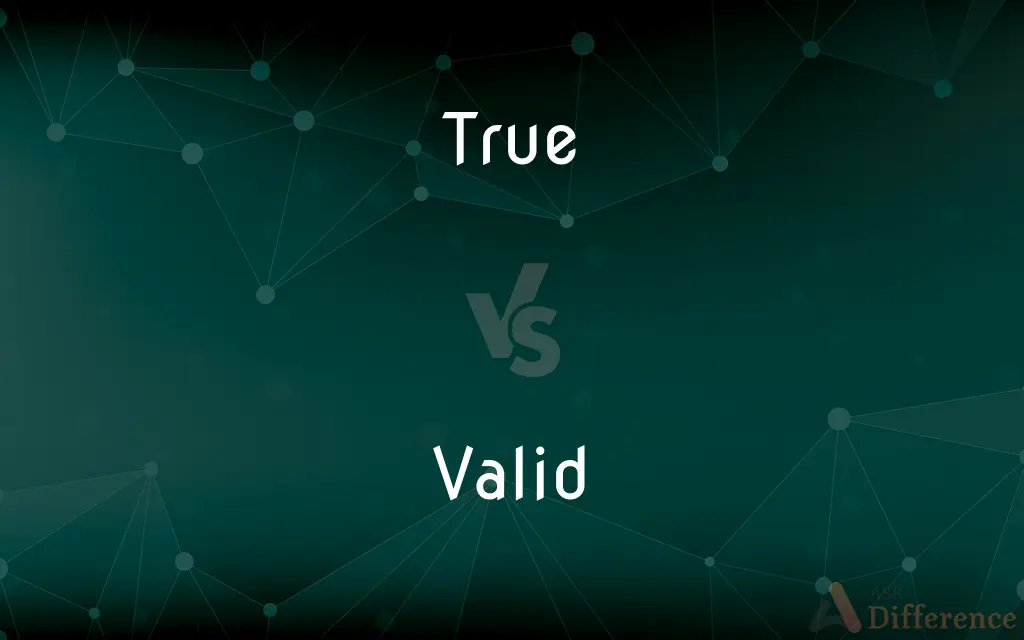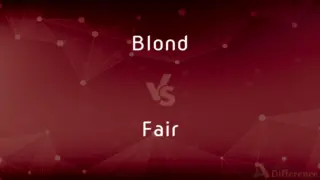True vs. Valid — What's the Difference?
Edited by Tayyaba Rehman — By Maham Liaqat — Updated on March 19, 2024
True refers to statements or propositions that accurately reflect reality or facts. Valid, in contrast, relates to the logical structure of arguments, where conclusions follow from premises, regardless of the truth of those premises.

Difference Between True and Valid
Table of Contents
ADVERTISEMENT
Key Differences
True is a term often used to describe statements, facts, or propositions that correspond with actual conditions, situations, or states of affairs. It's about factual accuracy and reality alignment. Valid, however, pertains to the field of logic, describing arguments where if the premises are assumed to be true, then the conclusion necessarily follows. This does not necessarily mean the premises or the conclusion are true in a factual sense, but rather that the argument's structure is logically correct.
The concept of truth is applicable in various contexts, including everyday language, science, and philosophy, indicating congruence with the facts or reality. Validity, on the other hand, is specifically a property of logical and mathematical arguments, focusing on the form of the argument rather than the factual accuracy of its components.
A statement being true is independent of any argumentative structure; it stands on its own as an accurate reflection of reality. In contrast, an argument's validity is determined by its logical structure, independent of the actual truth or falsity of its premises or conclusion. An argument can be valid with false premises and a false conclusion, as long as the logical structure holds that the conclusion follows from the premises.
For instance, the statement "The Earth revolves around the Sun" is true because it accurately describes our planetary system. However, the argument "If the Earth is flat (premise), then it does not revolve around the Sun (conclusion)" is valid in form because if one accepts the premise, the conclusion logically follows, despite the premise being factually incorrect.
The distinction highlights the importance of both truth and validity in understanding and communicating accurately. True statements are essential for factual correctness, while valid arguments are crucial for logical coherence and sound reasoning, especially in philosophical discussions and logical analysis.
ADVERTISEMENT
Comparison Chart
Definition
Correspondence with facts or reality.
Logical coherence of an argument.
Application
Describes statements or propositions.
Describes the structure of arguments.
Focus
Factual accuracy.
Logical structure.
Independent of
Argumentative structure.
Factual truth of premises.
Example
"Water boils at 100°C at sea level" is true.
"If all mammals have lungs, and whales are mammals, then whales have lungs" is valid.
Compare with Definitions
True
Accurate statement.
Her account of the event was found to be true.
Valid
Pertaining to argument coherence.
Her reasoning was valid, making her case strong.
True
Fidelity to an original or standard.
The movie stays true to the book.
Valid
Logically sound argument.
His argument was valid, so we accepted the conclusion.
True
Conforming to facts.
True statements form the basis of scientific knowledge.
Valid
Applicable in formal logic.
The theorem's proof is valid within its axiomatic system.
True
Verifiable by evidence.
The hypothesis was proven to be true through experimentation.
Valid
Independent of factual content.
A valid argument may have false premises.
True
Reflecting reality.
It is true that water freezes at 0°C.
Valid
Structure that ensures conclusion follows premises.
The logic puzzle's solution is valid.
True
Consistent with fact or reality; not false or erroneous
The true cost.
Valid
Well grounded; just
A valid objection.
True
Not counterfeit; real or genuine
True gold.
Valid
Producing the desired results; efficacious
Valid methods.
True
Conforming to the characteristics or criteria of a group or type; typical
A true crab.
A true gentleman.
Valid
Having legal force; effective or binding
A valid title.
True
Properly called
True value.
Valid
Containing premises from which the conclusion may logically be derived
A valid argument.
True
Reliable; accurate
A true prophecy.
Valid
Correctly inferred or deduced from a premise
A valid conclusion.
True
Faithful, as to a friend, vow, or cause; loyal.
Valid
(Archaic) Of sound health; robust.
True
(Archaic) Truthful, honest, or trustworthy.
Valid
Well grounded or justifiable, pertinent.
I will believe him as soon as he offers a valid answer.
True
Sincerely felt or expressed; unfeigned
True grief.
Valid
Acceptable, proper or correct; in accordance with the rules.
A valid format for the date is DD/MM/YY.
Do not drive without a valid license.
True
Rightful; legitimate
The true heir.
Valid
Related to the current topic, or presented within context, relevant.
True
Exactly conforming to a rule, standard, or pattern
Trying to sing true B.
Valid
(logic) Of a formula or system: such that it evaluates to true regardless of the input values.
True
Accurately shaped, fitted, or placed
Are the wheels true?.
Valid
(logic) Of an argument: whose conclusion is always true whenever its premises are true.
An argument is valid if and only if the set consisting of both (1) all of its premises and (2) the contradictory of its conclusion is inconsistent.
True
Determined with reference to the earth's axis, not the magnetic poles
True north.
Valid
Genuine - as distinguished from efficient or regular - sacrament.
True
Quick and exact in sensing and responding
A true ear.
Valid
Strong; powerful; efficient.
True
(Computers) Indicating one of two possible values taken by a variable in Boolean logic or a binary device.
Valid
Having sufficient strength or force; founded in truth; capable of being justified, defended, or supported; not weak or defective; sound; good; efficacious; as, a valid argument; a valid objection.
An answer that is open to no valid exception.
True
In accord with reality, fact, or truthfulness.
Valid
Having legal strength or force; executed with the proper formalities; incapable of being rightfully overthrown or set aside; as, a valid deed; a valid covenant; a valid instrument of any kind; a valid claim or title; a valid marriage.
True
Unswervingly; exactly
The archer aimed true.
Valid
Well grounded in logic or truth or having legal force;
A valid inference
A valid argument
A valid contract
A valid license
True
So as to conform to a type, standard, or pattern.
Valid
Still legally acceptable;
The license is still valid
True
To position (something) so as to make it balanced, level, or square
Trued up the long planks.
True
Truth or reality. Used with the.
True
Proper alignment or adjustment
Out of true.
True
(of a statement) Conforming to the actual state of reality or fact; factually correct.
This is a true story.
True
As an ellipsis of "(while) it is true (that)", used to start a sentence
True, I have only read part of the book, but I like it so far.
True
Conforming to a rule or pattern; exact; accurate.
A true copy;
A true likeness of the original
True
(logic) Of the state in Boolean logic that indicates an affirmative or positive result.
"A and B" is true if and only if "A" is true and "B" is true.
True
Loyal, faithful.
He’s turned out to be a true friend.
True
Genuine; legitimate, valid.
This is true Parmesan cheese.
The true king has returned!
True
Used in the designation of group of species, or sometimes a single species, to indicate that it belongs to the clade its common name (which may be more broadly scoped in common speech) is restricted to in technical speech, or to distinguish it from a similar species, the latter of which may be called false.
True spiders
True
Accurate; following a path toward the target.
True
(of a mechanical part) Correctly aligned or calibrated, without deviation.
Is my bike wheel true? It feels unsteady.
True
Fair, unbiased, not loaded.
True
(of a literary genre) based on actual historical events.
True
(of shooting, throwing etc) Accurately.
This gun shoots true.
True
(archaic) Truthfully.
True
(uncountable) The state of being in alignment.
True
Truth.
True
A pledge or truce.
True
To straighten (of something that is supposed to be straight).
He trued the spokes of the bicycle wheel.
True
To make even, level, symmetrical, or accurate, align; adjust.
We spent all night truing up the report.
True
Conformable to fact; in accordance with the actual state of things; correct; not false, erroneous, inaccurate, or the like; as, a true relation or narration; a true history; a declaration is true when it states the facts.
True
Right to precision; conformable to a rule or pattern; exact; accurate; as, a true copy; a true likeness of the original.
Making his eye, foot, and hand keep true time.
True
Steady in adhering to friends, to promises, to a prince, or the like; unwavering; faithful; loyal; not false, fickle, or perfidious; as, a true friend; a wife true to her husband; an officer true to his charge.
Thy so true,So faithful, love unequaled.
Dare to be true: nothing can need a lie.
True
Genuine; real; not deviating from the essential characters of a class; as, a lizard is a true reptile; a whale is a true, but not a typical, mammal.
True
In accordance with truth; truly.
True
Proper alignment; the property possessed by something that is in correct or proper alignment;
Out of true
True
Make level, square, balanced, or concentric;
True up the cylinder of an engine
True
Consistent with fact or reality; not false;
The story is true
It is undesirable to believe a proposition when there is no ground whatever for supposing it true
The true meaning of the statement
True
Not synthetic or spurious; of real or natural origin;
Real mink
True gold
True
Conforming to definitive criteria;
The horseshoe crab is not a true crab
Pythagoras was the first true mathematician
True
Devoted (sometimes fanatically) to a cause or concept or truth;
True believers bonded together against all who disagreed with them
True
Expressing or given to expressing the truth;
A true statement
Gave truthful testimony
A truthful person
True
Worthy of being depended on;
A dependable worker
An honest working stiff
A reliable source of information
He was true to his word
I would be true for there are those who trust me
True
Not pretended; sincerely felt or expressed;
Genuine emotion
Her interest in people was unfeigned
True grief
True
Rightly so called;
True courage
A spirit which true men have always admired
A true friend
True
Determined with reference to the earth's axis rather than the magnetic poles;
True north is geographic north
True
Having a legally established claim;
The legitimate heir
The true and lawful king
True
In tune; accurate in pitch;
A true note
True
Accurately fitted; level;
The window frame isn't quite true
True
Reliable as a basis for action;
A true prophesy
True
As acknowledged;
True, she is the smartest in her class
Common Curiosities
Can a statement be both true and part of a valid argument?
Yes, if the statement accurately reflects reality and is used in an argument where the conclusion necessarily follows from the premises.
How can I determine if an argument is valid?
By analyzing its logical structure to see if the conclusion necessarily follows from the premises, without considering the truth of those premises.
What is an example of a true statement?
"The moon orbits the Earth" is a true statement because it accurately describes the moon's relationship with the Earth.
What is an example of a valid argument with false premises?
"If all cars are blue (false premise), and my car is a car, then my car is blue (conclusion)." This argument is valid because the conclusion follows from the premise, even though the premise is false.
What does it mean for a statement to be true?
It accurately reflects or corresponds to reality or facts.
Is a valid argument always true?
No, a valid argument can have false premises and still be valid if the conclusion logically follows from those premises.
Can a true statement be part of an invalid argument?
Yes, if the argument's conclusion does not logically follow from its premises, even if the premises are true.
What makes an argument valid?
Its conclusion logically follows from its premises, regardless of the truth of those premises.
Why is it important to distinguish between true and valid?
Because it helps in assessing both the factual accuracy of statements and the logical coherence of arguments.
How does truth relate to validity in logic?
While truth concerns the factual accuracy of statements, validity relates to the structure of arguments. An argument's validity is assessed independently of the truth value of its premises.
Share Your Discovery

Previous Comparison
Blond vs. Fair
Next Comparison
Phalange vs. PhalanxAuthor Spotlight
Written by
Maham LiaqatEdited by
Tayyaba RehmanTayyaba Rehman is a distinguished writer, currently serving as a primary contributor to askdifference.com. As a researcher in semantics and etymology, Tayyaba's passion for the complexity of languages and their distinctions has found a perfect home on the platform. Tayyaba delves into the intricacies of language, distinguishing between commonly confused words and phrases, thereby providing clarity for readers worldwide.














































